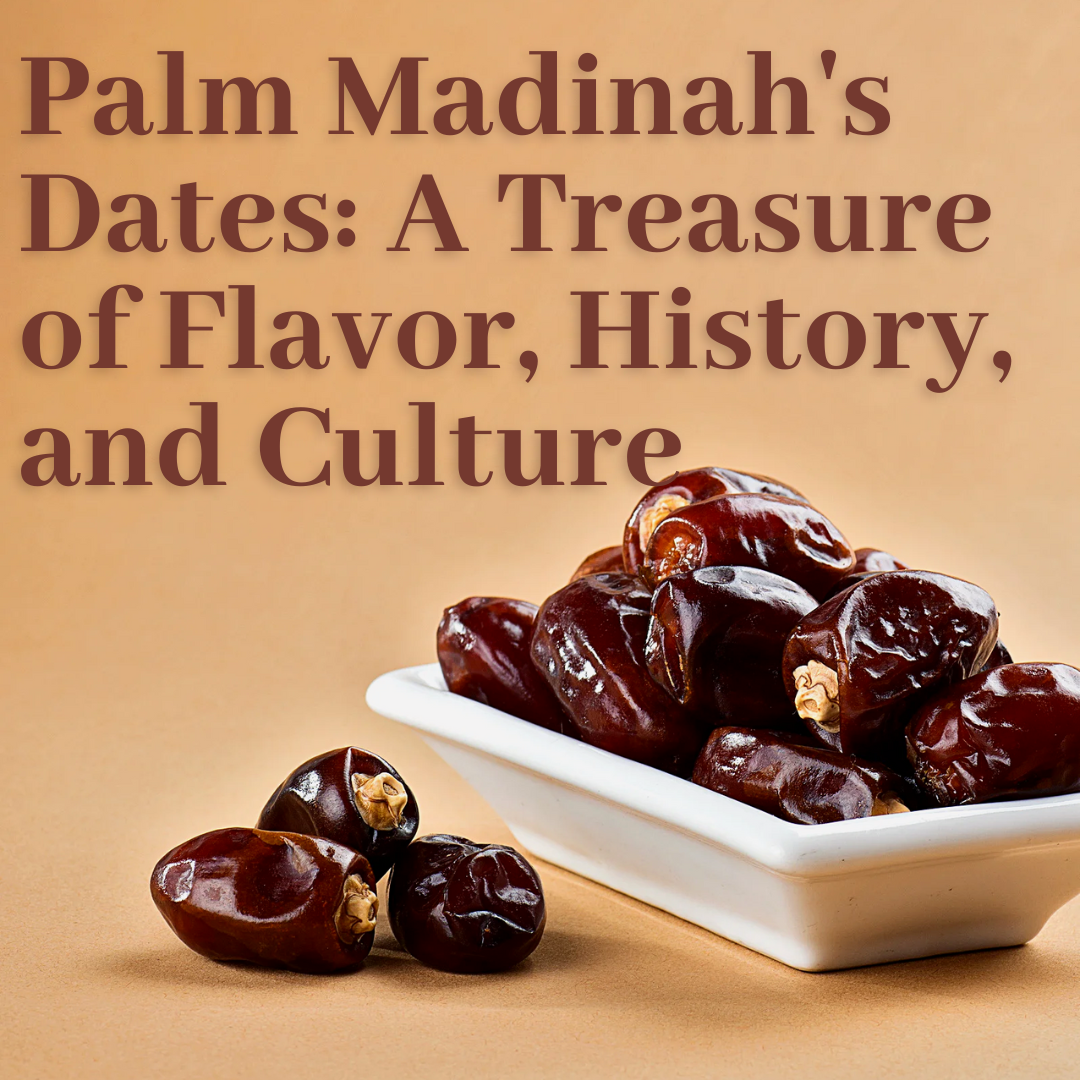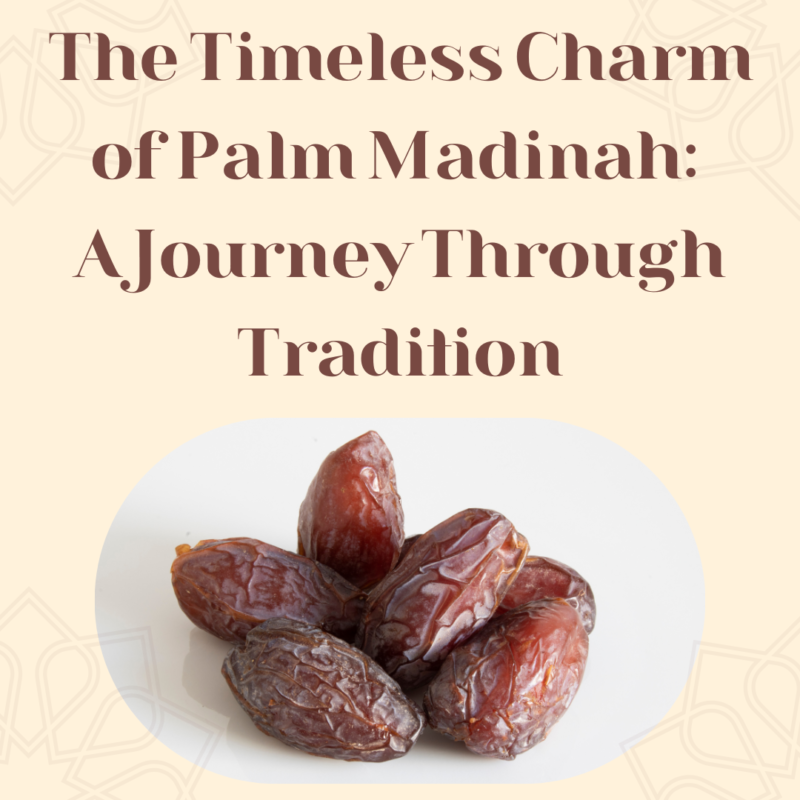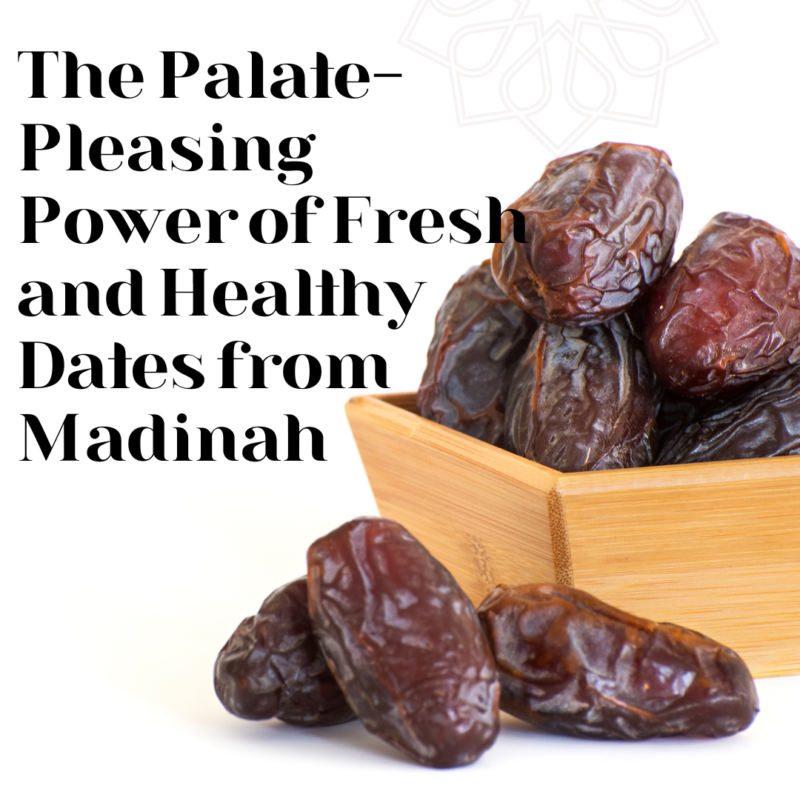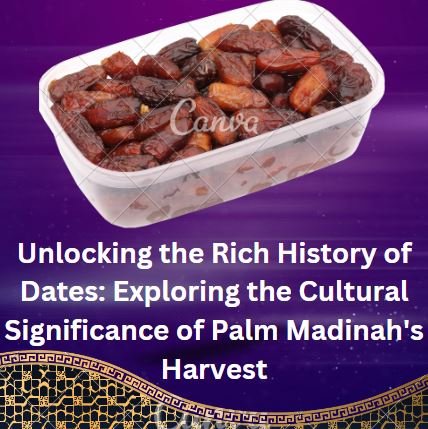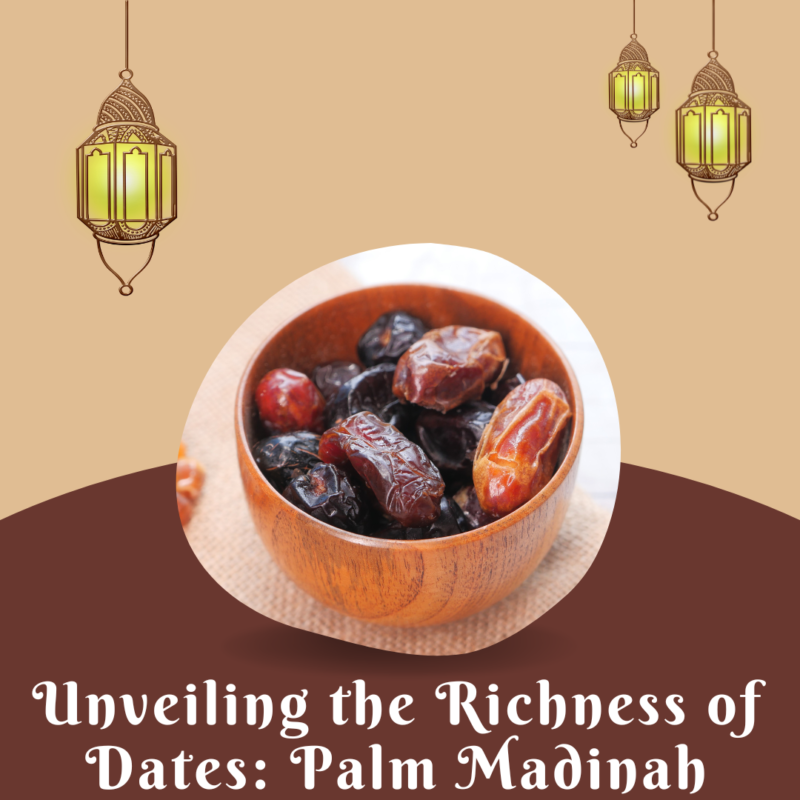Palm Madinah’s dates are renowned for their high quality, taste, and historical significance. Dates from the city of Madinah, located in Saudi Arabia, hold a special place in the hearts of people around the world. Not only are these dates a culinary delight, but they also carry deep cultural and religious importance, especially for Muslims due to their association with the Prophet Muhammad’s era. This blog post will delve into the unique aspects of Palm Madinah’s dates, exploring their varieties, cultivation, benefits, and significance in the cultural and spiritual landscape.
1. Historical and Cultural Importance:
Madinah’s dates have a deep historical and cultural significance that can be traced back to the time of the Prophet Muhammad. Madinah is often referred to as the “City of Dates” because of its rich tradition of cultivating date palms, which dates back centuries. During the Prophet’s time, dates were a staple food source and held great symbolic importance. They were consumed daily and used in various religious and social rituals. To this day, dates remain an essential part of the culture in Madinah and across the Islamic world.
2. Varieties of Madinah Dates:
Madinah is home to several unique date varieties, each with its distinct flavor, texture, and appearance. Some of the most popular varieties include:
Ajwa Dates: Ajwa dates are perhaps the most famous and revered variety from Madinah. Known for their soft, chewy texture and rich, sweet flavor, Ajwa dates are often referred to as the “King of Dates.” They hold special religious significance due to the Prophet Muhammad’s preference for them.
Sukary Dates: Sukary dates are known for their golden color and honey-like sweetness. They are soft and juicy, making them a favorite for snacking and desserts.
Safawi Dates: Safawi dates are dark, almost black in color, with a smooth, dense texture. They have a deep, rich flavor and are packed with nutrients.
Khudri Dates: Khudri dates are large, dark brown dates with a sweet, caramel-like taste. They are often used for baking and cooking due to their robust flavor.
These are just a few examples of the many date varieties found in Madinah. Each type has its unique characteristics and is cherished for its exceptional quality.
3. Cultivation and Harvesting:
The cultivation of date palms in Madinah is a meticulous process that requires skill and care. Farmers in the region have honed their expertise over generations, ensuring that the dates they produce are of the highest quality. Here are some key aspects of date palm cultivation and harvesting in Madinah:
Climate and Soil: Madinah’s climate is ideal for date palm cultivation, with hot summers and mild winters. The region’s sandy soil provides excellent drainage, which is crucial for date palms to thrive.
Irrigation: Date palms require regular irrigation, especially during the hot summer months. Farmers in Madinah use traditional irrigation methods, such as flood irrigation, to provide the necessary water to their crops.
Pollination: Date palms are either male or female, and cross-pollination is necessary for fruit production. Farmers in Madinah often manually pollinate their date palms to ensure a successful harvest.
Harvesting: Date harvesting in Madinah typically occurs between July and September. The fruit is hand-picked when it reaches the desired level of ripeness, ensuring that each date is of the highest quality.
4. Nutritional Benefits:
Dates from Madinah are not only delicious but also highly nutritious. They are a rich source of essential nutrients, including:
Vitamins and Minerals: Dates contain vitamins such as vitamin A, vitamin K, and various B vitamins, as well as minerals like potassium, magnesium, and iron.
Fiber: Dates are high in dietary fiber, which aids in digestion and helps maintain healthy blood sugar levels.
Antioxidants: Dates are rich in antioxidants, which help protect the body from oxidative stress and inflammation.
Natural Sugars: Dates are a natural source of sugars, providing a quick energy boost without the negative effects of refined sugars.
Consuming Madinah dates can contribute to overall health and well-being due to their nutrient-rich profile.
- Culinary Uses:
Madinah’s dates are versatile and can be enjoyed in various ways:
Snacking: Fresh dates are a delightful snack on their own, providing a quick energy boost and a sweet treat.
Baking and Cooking: Dates can be used in baking to add natural sweetness and moisture to cakes, cookies, and bread. They can also be incorporated into savory dishes such as stews and tagines for added flavor.
Smoothies and Shakes: Dates blend well into smoothies and shakes, adding natural sweetness and a creamy texture.
Stuffed Dates: Dates can be stuffed with nuts, cheese, or other fillings for a delicious appetizer or dessert.
- Religious and Spiritual Significance:
Madinah’s dates hold a special place in the religious and spiritual lives of Muslims. They are often consumed during the month of Ramadan to break the fast at sunset. This tradition dates back to the time of the Prophet Muhammad, who would break his fast with dates and water. Dates are also given as gifts during religious occasions, weddings, and other celebrations, symbolizing hospitality and generosity.
7. Sustainable Practices:
Date palm cultivation in Madinah is rooted in sustainable practices that prioritize the health of the environment and the community. Farmers use traditional methods to manage their orchards, reducing the need for chemical fertilizers and pesticides. This approach not only protects the land and water resources but also ensures the longevity of date palm cultivation in the region.
Conclusion:
Palm Madinah’s dates are a treasure trove of culinary, cultural, and spiritual value. They offer a taste of history and tradition that transcends generations and borders. Whether enjoyed as a snack, incorporated into recipes, or shared during special occasions, Madinah’s dates continue to be cherished by people around the world. Their exceptional quality, nutritional benefits, and deep-rooted significance make them a true gift from the desert oasis of Madinah.
Palm Madinah’s Dates: A Treasure of Flavor, History, and Culture
Palm Madinah’s dates stand as a symbol of excellence, history, and tradition. This region in Saudi Arabia is revered for producing some of the world’s finest dates, known not only for their exceptional taste but also for their deep-rooted cultural and spiritual significance. In this extended exploration of Palm Madinah’s dates, we’ll delve further into their rich heritage, diverse varieties, meticulous cultivation, nutritional benefits, culinary versatility, and spiritual significance. We’ll also examine how sustainable practices contribute to the longevity and quality of date palm cultivation in the region.
1. Historical and Cultural Importance:
The story of Palm Madinah dates stretches back to ancient times, intertwining with the region’s storied past. Madinah, often called the “City of Dates,” holds a special place in history as a key center for date palm cultivation. Dates were a primary source of sustenance for early inhabitants and played a crucial role in trade and commerce. The Prophet Muhammad himself cherished these dates, incorporating them into his daily life and religious practices.
Today, the cultural legacy of Madinah’s dates lives on through traditional cultivation methods and community values that emphasize hospitality and generosity. Dates are a cornerstone of celebrations, feasts, and family gatherings, fostering a sense of unity and heritage.
2. Varieties of Madinah Dates:
Madinah’s date varieties showcase the diversity of flavors and textures found in the region:
- Mabroom Dates: Known for their elongated shape and dark hue, Mabroom dates offer a unique combination of sweetness and depth, making them a sought-after treat.
- Barhi Dates: These dates are prized for their small size and exceptional sweetness, often enjoyed fresh as well as dried.
- Zahidi Dates: With a light golden hue, Zahidi dates boast a firmer texture and a subtler sweetness, perfect for a variety of culinary uses.
These varieties, along with Ajwa, Sukary, Safawi, and Khudri dates, form an exquisite tapestry of flavors that represent the best of Palm Madinah’s dates.
3. Cultivation and Harvesting:
The cultivation of date palms in Madinah is a testament to the farmers’ dedication and expertise. Key aspects of this process include:
- Pruning: Farmers meticulously prune the date palms to encourage healthy growth and optimize fruit production.
- Ripening Phases: Dates go through several ripening phases, from unripe to fully mature, each stage offering distinct flavors and uses.
- Post-Harvest Processing: Dates are carefully sorted, cleaned, and packaged to maintain their quality and freshness.
Farmers’ intimate knowledge of the land and climate ensures the successful cultivation of high-quality dates.
4. Nutritional Benefits:
The nutritional profile of Palm Madinah’s dates goes beyond their natural sweetness. They provide:
- Energy-Boosting Compounds: The natural sugars in dates offer an immediate source of energy, making them ideal for athletes and those with active lifestyles.
- Bone Health Support: Dates contain key minerals such as calcium and phosphorus, contributing to bone health and density.
- Heart Health Benefits: The potassium content in dates supports healthy blood pressure levels and heart function.
Including Madinah dates in your diet can have a positive impact on overall health and vitality.
5. Culinary Uses:
The versatility of Madinah’s dates extends to an array of culinary delights:
- Date Syrup: Extracted from dates, date syrup is a natural sweetener used in baking, cooking, and beverages.
- Date Paste: Date paste is a versatile ingredient for recipes such as energy bars, cookies, and other desserts.
- Date Vinegar: A unique product made from fermented dates, date vinegar adds depth and complexity to dishes.
Dates can be incorporated into both traditional and contemporary recipes, offering an elevated culinary experience.
6. Religious and Spiritual Significance:
Palm Madinah’s dates are intertwined with the religious practices and traditions of Muslims around the world. The Prophet Muhammad’s fondness for Ajwa dates has led to their revered status in the Islamic faith. Consuming dates during Ramadan, particularly to break the fast, is a cherished ritual that connects individuals with their spiritual heritage.
The giving of dates as gifts during religious occasions or moments of celebration fosters a sense of community and strengthens social bonds.
7. Sustainable Practices:
Sustainability is at the heart of date palm cultivation in Madinah. Traditional farming methods prioritize:
- Water Conservation: Efficient irrigation techniques, such as drip irrigation, help preserve water resources in the arid climate.
- Organic Farming: Many farmers opt for organic cultivation methods, reducing the use of chemical pesticides and fertilizers.
- Biodiversity: Farmers maintain diverse orchards, growing multiple date varieties to promote ecosystem health.
These practices not only ensure the longevity of date cultivation but also safeguard the natural environment for future generations.
Conclusion:
Palm Madinah’s dates are more than just a delicious treat—they represent a connection to history, culture, and spirituality. From the skilled hands of local farmers to the plates of people worldwide, these dates offer a taste of tradition and a glimpse into the heart of Madinah. Whether enjoyed as a snack, used in cooking, or shared during meaningful moments, Madinah’s dates continue to enrich lives and inspire a sense of wonder. Their exceptional quality, nutritional benefits, and deep-rooted significance make them a true gift from the desert oasis of Madinah.

